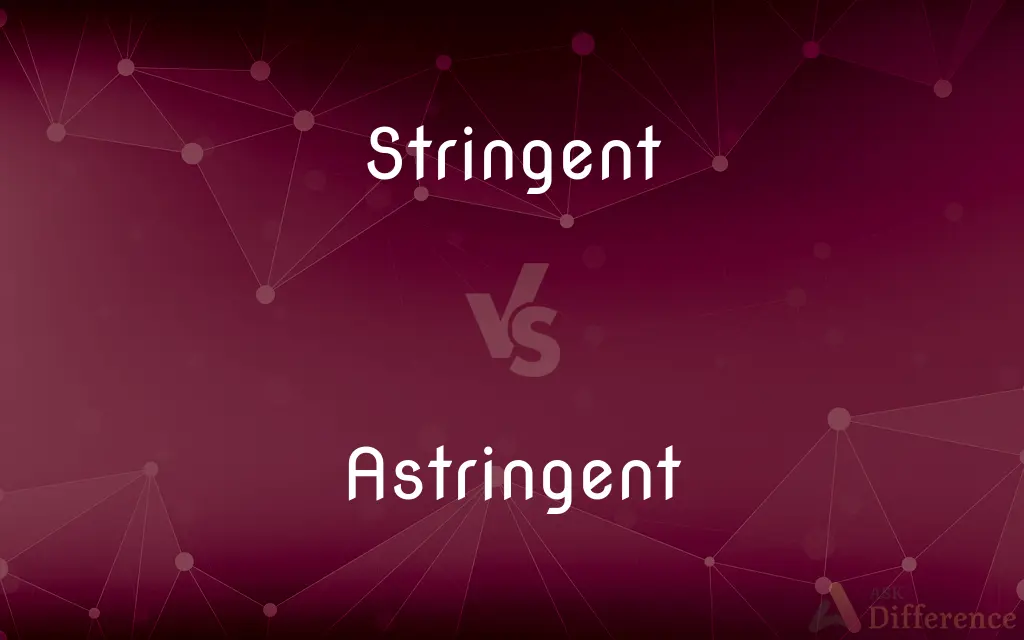Stringent vs. Astringent — What's the Difference?
Edited by Tayyaba Rehman — By Urooj Arif — Updated on March 29, 2024
Stringent measures are strictly imposed and enforced, while astringent substances cause skin or tissue contraction.

Difference Between Stringent and Astringent
Table of Contents
ADVERTISEMENT
Key Differences
Stringent regulations are often strict and precise, demanding compliance, whereas astringent properties are linked to the physical effect of causing contraction in body tissues.
Stringent policies are usually applied in contexts like legal, regulatory, or policy enforcement to ensure adherence to certain standards. On the other hand, astringent is a term commonly used in pharmacology and cosmetology, describing substances that tighten pores and reduce oiliness on the skin.
While stringent conditions refer to the severity and rigidity in rules or requirements, astringents refer to chemical properties that result in shrinkage or constriction of body tissues.
The impact of stringent measures is metaphorically tightening control or enforcement, whereas the effect of astringents is literally tightening or constricting tissues.
Despite their differences, both terms metaphorically and literally involve the concept of tightening or making more strict, albeit in very different contexts and manners.
ADVERTISEMENT
Comparison Chart
Definition
Imposing rigorous standards or conditions; strict.
Causing the contraction of skin cells and other body tissues.
Usage Context
Often used in legal, policy, or regulatory contexts.
Commonly used in pharmacology, cosmetology, and related fields.
Primary Effect
Enforces compliance or adherence to certain standards or rules.
Causes physical contraction and tightening of tissues, especially skin.
Example Application
Stringent environmental regulations require companies to reduce emissions.
Astringent lotions are applied to the skin to reduce oiliness and shrink pores.
Metaphorical vs Literal
Metaphorically tightens controls or enforcement.
Literally tightens or constricts body tissues.
Compare with Definitions
Stringent
Requiring strict adherence to specified rules or standards.
Stringent quality controls ensure the product meets high standards.
Astringent
Harsh or severe in manner or character.
Her astringent criticism made it clear she was not pleased with the work.
Stringent
Strict or severe in the application of rules or standards.
The teacher's stringent grading policy left no room for late assignments.
Astringent
Having a tightening effect on living tissue; antiseptic.
The astringent properties of witch hazel make it popular in skin care routines.
Stringent
Characterized by or enforcing strict precision and formality.
The stringent dress code required formal attire at all times.
Astringent
Tending to draw together or constrict soft organic tissue.
Astringent herbs are often used in traditional remedies for their healing properties.
Stringent
Imposing rigorous standards or conditions; demanding strict attention to rules and procedures.
The new safety regulations are more stringent than ever before.
Astringent
Causing the contraction of body tissues, typically used to reduce bleeding from minor abrasions.
After shaving, he applied an astringent lotion to soothe and tighten his skin.
Stringent
Rigorously binding or exacting; strict.
The contract includes a number of stringent requirements that must be met.
Astringent
A substance that causes contraction of body tissues and canals.
The recipe called for an astringent juice like lemon to balance the sweetness.
Stringent
Imposing rigorous standards of performance; severe
Stringent safety measures.
Astringent
An astringent (sometimes called adstringent) is a chemical that shrinks or constricts body tissues. The word derives from the Latin adstringere, which means "to bind fast".
Stringent
Constricted; tight
Operating under a stringent time limit.
Astringent
(Medicine) Tending to draw together or constrict tissues; styptic.
Stringent
Characterized by scarcity of money, credit restrictions, or other financial strain
Stringent economic policies.
Astringent
Sharp and penetrating; pungent or severe
Astringent remarks.
Stringent
; binding strongly; making strict requirements; restrictive; rigid; severe
They have stringent quality requirements outlining what is acceptable.
Astringent
Extremely sour, bitter.
Stringent
Binding strongly; making strict requirements; restrictive; rigid; severe; as, stringent rules.
They must be subject to a sharper penal code, and to a more stringent code of procedure.
Astringent
Sharp, caustic, severe.
Stringent
Demanding strict attention to rules and procedures;
Rigorous discipline
Tight security
Stringent safety measures
Astringent
Causing a dry or puckering mouthfeel; characteristic of foods with high tannin content, such as certain kinds of berries and citrus fruits.
Astringent
(medicine) Having the effect of drawing tissue together; styptic.
Astringent
Drawing together the tissues; binding; contracting; - opposed to laxative; as, astringent medicines; a butter and astringent taste; astringent fruit.
Astringent
Stern; austere; as, an astringent type of virtue.
Astringent
A drug that causes contraction of body tissues and canals
Astringent
Sour or bitter in taste
Astringent
Tending to draw together or constrict soft organic tissue;
Astringent cosmetic lotions
Common Curiosities
What does stringent mean?
Stringent refers to something strict, precise, and demanding adherence to rules or standards.
What are examples of stringent measures?
Examples include strict pollution controls and rigorous safety regulations.
What is an astringent commonly used for?
Astringents are commonly used to tighten pores, reduce oiliness, and can serve antiseptic purposes.
How do stringent and astringent differ in application?
Stringent is applied in regulatory or policy contexts, while astringent is used in pharmacology and skincare.
Can a policy be both stringent and astringent?
No, a policy can be stringent (strict in requirements), but not astringent, as astringent relates to physical contraction of tissues.
How does astringent affect the skin?
Astringent tightens the skin and pores, potentially reducing oiliness and improving skin appearance.
Are stringent conditions always legal in nature?
While often legal or regulatory, stringent can also refer to any situation requiring strict adherence to standards.
Are there any risks associated with using astringents?
Overuse or use on sensitive skin can cause dryness or irritation.
Can an astringent be a natural product?
Yes, many astringents, like witch hazel or green tea, are natural products.
Is stringent compliance beneficial?
Stringent compliance can ensure safety, quality, and fairness, though it may also impose burdens.
Do stringent regulations affect business operations?
Yes, stringent regulations can significantly impact business operations, often requiring adjustments to comply.
Can astringent substances help with acne?
Yes, by tightening pores and reducing oiliness, astringents can help manage acne.
What industries use astringents?
Astringents are used in cosmetics, skincare, and sometimes in medical fields.
How do cultural perceptions of stringent and astringent differ?
Cultural perceptions vary, but stringent often carries a notion of necessary rigor, while astringent might be seen more in terms of its beneficial or medicinal properties.
Why are stringent safety standards important in workplaces?
They protect employees from harm and ensure a safe working environment.
Share Your Discovery

Previous Comparison
Mate vs. Matt
Next Comparison
Group vs. ClassAuthor Spotlight
Written by
Urooj ArifUrooj is a skilled content writer at Ask Difference, known for her exceptional ability to simplify complex topics into engaging and informative content. With a passion for research and a flair for clear, concise writing, she consistently delivers articles that resonate with our diverse audience.
Edited by
Tayyaba RehmanTayyaba Rehman is a distinguished writer, currently serving as a primary contributor to askdifference.com. As a researcher in semantics and etymology, Tayyaba's passion for the complexity of languages and their distinctions has found a perfect home on the platform. Tayyaba delves into the intricacies of language, distinguishing between commonly confused words and phrases, thereby providing clarity for readers worldwide.















































